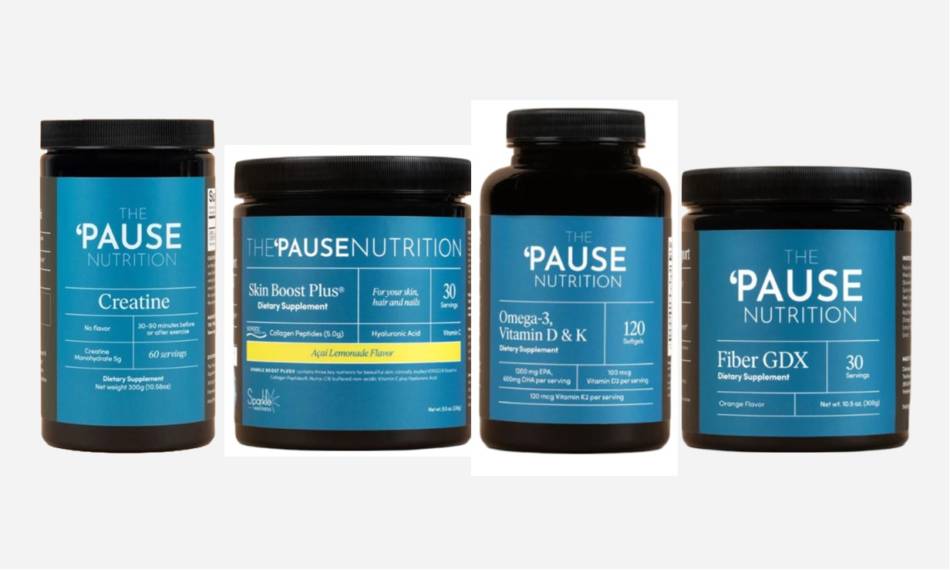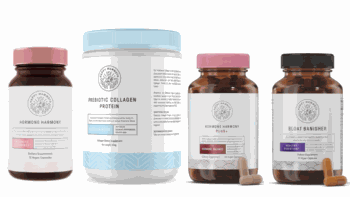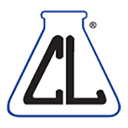Our Members Asked:
ConsumerLab’s Review of The 'Pause Nutrition Supplements by Dr. Mary Claire Haver – Are They Worth It?

Answer:
Although ConsumerLab has not tested The 'Pause Nutrition products by Dr. Mary Claire Haver (author of The New Menopause), these products would be unlikely to rank among ConsumerLab’s top choices for women in mid-life based on our assessment of their label information and pricing, as discussed below.
Omega-3 + Vitamin D3 & K2
Higher Doses Than Necessary
A suggested daily serving of 4 softgels of Omega-3 + Vitamin D3 & K2 lists substantial amounts of omega-3 fatty acids (1,800 mg) from fish oil as well as vitamin D and K. However, the 100 mcg (4,000 IU) daily dose of vitamin D is much higher than the recommended daily allowance of 15 to 20 mcg (600 to 800 IU) and is right at the Upper Tolerable Intake Level for vitamin D, above which you may be doing more harm than good, as discussed in our Vitamin D Supplements Review. Unless you've been diagnosed as deficient in vitamin D, this dose is excessive. For most women, the 25 mcg (1,000 IU) of vitamin D in just a single softgel (rather than four) should be more than sufficient to meet requirements for vitamin D, as well as for vitamin K (which most people don’t need to take), and even for the omega-3s (EPA and DHA), which technically, are not essential, but may be worthwhile if you don’t each much fish. In fact, the omega-3s in a single softgel is even more than the amount (300 mg) that a study found to reduce menopausal symptoms postmenopausal women (as discussed in our Fish Oil Supplements Review.)
Many clinical studies with vitamin D have shown that, unless a woman has a vitamin D level below 20 to 30 ng/mL, supplementation has generally not been helpful to older women (as discussed in the discussed in the Bones and Fractures section of our vitamin D review). However, getting more calcium from the diet or supplements becomes important with age: At age 51, the daily calcium requirement for women increases to 1,200 mg from 1,000 mg, while the requirement for vitamin D does not change. Supplementing to get adequate calcium, as well as vitamin D, may be particularly important for middle-aged women on vegan diets.
With a bottle of 120 softgels priced at $45 (plus shipping), the suggested daily cost for 4-softgels is over $1.50. Per softgel, this works out to about 38 cents and a single softgel may be all you really need, providing 25 mcg (1,000 IU) of vitamin D, 30 mcg of vitamin K as menaquinone-7 (also known as vitamin K2 as MK-7), and 375 mg of omega-3s.
We like that the label suggests taking the softgels with fatty foods. This will greatly increase absorption of vitamin D and possibly the other ingredients, all of which are fat-soluble.
Be aware that if you just need vitamin D, our tests and comparisons show that you can get 25 mcg (1,000 IU) from a high-quality softgel for as little as 4 cents, as in our Top Pick for vitamin D.
Fiber GDX
A Costly Option for Basic Fiber Needs
Fiber GDX is, essentially, a psyllium husk powder (the fiber ingredient in products such as Meta Mucil 3-in-1 FIBER, Konsyl, and Equate Daily Fiber) with some added buckwheat, millet, and quinoa, and amaranth, chia seed, apple fiber and citrus pectin, which can also contribute fiber. Psyllium husk powder can be an effective, gentle laxative, due to its insoluble, gel-forming fiber. It's not possible to know how much of these ingredients are in the Fiber GDX because its Supplement Facts panel does not say (which doesn't seem to follow rules for these panels). The label notes that a 10-gram serving provides 8 grams of carbs (of which 7 grams are dietary fiber) but it does not show the amount of soluble fiber or psyllium husk.
Fiber GDX costs about 2 to 4 times as much as other, popular, psyllium products. Fiber GDX is $1.33 per 10-gram serving ($40 for 30 servings, plus shipping of about $8). Ten grams of psyllium husk from other, popular products costs around 20 cents to 60 cents. Our Top Pick in our Psyllium Husk Review, for example, costs 28 cents for a 5-gram serving (so 58 cents for 10-grams). It's possible that Fiber GDX tastes better than regular psyllium husk powders due to its additional ingredients (including the sweeteners stevia and monk fruit), but you can always mix psyllium husk powder with your own ingredients (and always mixing with a large amount of water or other beverage).
It's worth noting that the 7 grams of fiber in a 10-gram serving of Fiber GDX may be too much at one time for some people, as it can cause gas and bloating. About half that dose is more typical with psyllium husk powder. To its credit, Fiber GDX suggests starting with just ¼ dose and increasing to a full dose over a few weeks.
Be aware that tests by ConsumerLab have found lead contamination to be common in psyllium husk products (ranging from 0.58 mcg (as in our Top Pick) to as much as 8.5 mcg, per 4 grams of fiber). We don’t know how much lead is in Fiber GDX, nor if is being tested for lead. The ‘Pause Nutrition claims that its products are "Third-Party Tested" but does not appear to disclose who the third party is, what is tested, or its limits on contamination.
Skin Boost Plus
Consider Getting Collagen for Less
There is some evidence that taking collagen can provide a very small reduction in the depth of wrinkles, which has made it a popular supplement. A 1-scoop serving of Skin Boost Plus provides 5 grams of collagen (as Verisol bovine collagen peptides), along with 100 mg of vitamin C and 100 mg of hyaluronic acid. The amount of vitamin C is just slightly more than the daily requirement, is safe, and can be used by the body to make collagen, although few people are deficient in it.
A container of Skin Boost Plus costs $40 plus shipping and provides about 30 single-scoop servings, each costing $1.33. You can get the same amount and brand of collagen (5 grams) from our Top Pick in our Collagen Supplements Review for 64 cents, less than half the cost of Skin Boost Plus, and you can get 100 mg of powdered vitamin C for as little as 1 cent from the Top Pick in our Vitamin C Supplements Review. It's unclear if the addition of hyaluronic acid makes a difference: A study has been cited by a supplement company to claim a benefit from a combination of hyaluronic acid, collagen, and vitamin C, but that study does not appear to have been published.
Creatine
Is It Right for Mid-Life Health?
The ‘Pause Life website page for its Creatine supplement says that creatine helps increase energy and build muscle mass. This isn't quite true. Some, but not all studies suggest creatine supplements can improve muscle strength and endurance during repeated high-intensity exercise of short duration, such as weightlifting and sprinting, but is not helpful in purely aerobic exercise. The evidence is mixed as to whether it can benefit older adults when combined with resistance training.
A 5-gram serving of this creatine product costs 58 cents, based on $35 for a container providing 60 servings, and that does not include the cost of shipping. We have found that you can get 5 grams of high-quality creatine for half this price (26 cents) from the Top Pick in our Creatine Supplements Review.
For information about other supplements marketed for menopause, see our review of supplements with soy and red clover isoflavones and black cohosh. Also see our article about Hormone Harmony and other supplements by Happy Mammoth.
Join today to unlock all member benefits including full access to all CL Answers and over 1,400 reviews.
Join NowAlready a member? Sign In Here.
Join now at www.consumerlab.com/join/







Margaret Frank
March 13, 2025The reason i subscribe to Consumer Lab. If i took every supplement being sold guaranteed to keep me young and attractive forever, i would have over dosed by now. Thank you Consumer Lab for keeping me healthy with common sense.
Reply to this post…
Christie21785
January 28, 2025Thank you for the review.
Reply to this post…
Kim21765
January 28, 2025Claire-Haver is doing wonders as far as changing the conversation around menopause, so I’m not going to fault her for making a profit after dedicating so much of her life to doling out free advice. I’m also not dumb enough to buy from her, though.
Kelly21972
February 13, 2025Totally agree!
Reply to this post…
linda21760
January 28, 2025Thank you for the review. Very informative, per usual.
 ConsumerLab.com
ConsumerLab.com
January 28, 2025Glad you found it helpful!
Reply to this post…
Megann21699
January 21, 2025Thank you for your take on these products. I am a consumer of them in addition to HRT for mid life management!
Cindy21769
January 28, 2025I'm a dietitian and I tell all of my clients (women over 50) that they can get all of Dr Haver's supplements for MUCH cheaper elsewhere. She may have good intentions but her products are a ripoff IMHO.
Reply to this post…
terri21428
December 14, 2024I used to really value Dr Haver's posts but she has become a hawker of her products, her programs, her books.
Anna21700
January 21, 2025I feel the exact same way! So disappointing!
maureen22113
March 02, 2025I totally agree with your comment. I've stopped following her.
Reply to this post…
Jill21039
November 06, 2024I feel the same as others. I respect Dr Haver. But when these people sell their own supplements, they are off the show for me. I used to regularly follow a dietician who started doing the same thing. I quit listening to her.
Reply to this post…
Mary21031
November 05, 2024I love what Dr. Haver is doing, trying to actually help women now, before the science catches up with her. At least she is trying to put in one place all the things menopausal women might need to avoid some of the debilitating effects of menopause, which storm us unnoticed until we realize we can't sleep, have developed jelly bellies, and are told our bones have turned to stryofoam. Thanks for taking a look at her projects.
Lori21069
November 10, 2024I totally understand wanting to understand all the supplement science (I was thrust into menopause by breast cancer treatment, so I totally get it, for real), but the current NIH research on vitamins is extremely well-researched. Please see your PCP and get her to check all your levels before taking such high levels of D, etc.
Reply to this post…
Teresa21028
November 05, 2024As a menopausal woman, I really appreciate this review. While I value the information Dr Mary Claire Haver shares, I find myself increasingly annoyed at all the medical providers hawking their own (very expensive) supplements, leading you to believe your life and health would be so much better if you started taking their “proprietary” miracle supplements.
Reply to this post…
Desiree21022
November 05, 2024I feel like menopause is a bit of a gold rush for supplement makers and opportunists right now. Regular, common products seem to be popping up with the word ‘menopause’ in front of them, or in this case, ‘’pause’ and somehow that makes them more expensive. Just putting the word menopause in front of a name doesn’t make the product more appropriate for women.
I appreciate you taking the time to point us to the same products, at lower prices (if we even need them in the first place).
Reply to this post…